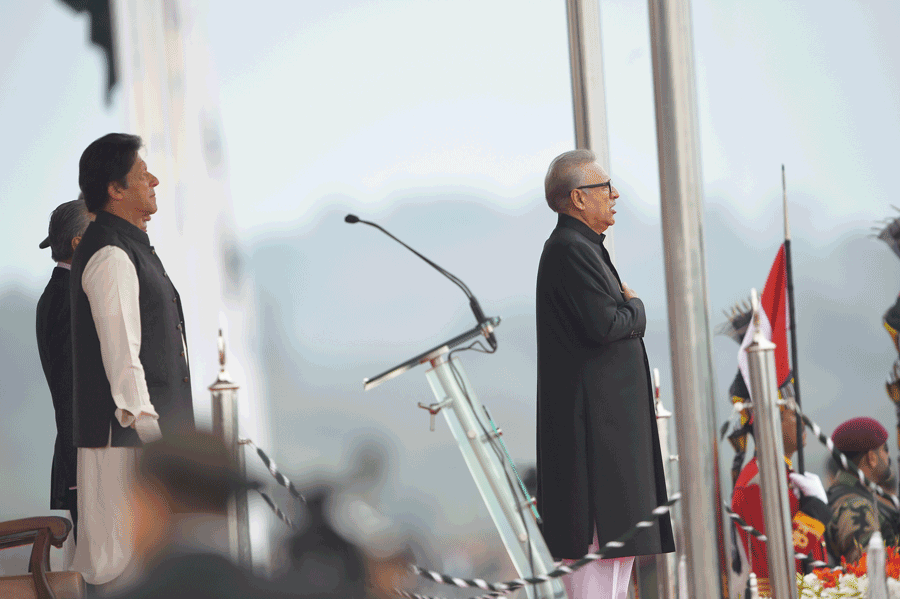Presidential Suite
By K. K. Shahid | Newsbeat National | Published 6 years ago

Prime Minister Imran Khan (l) and President Arif Alvi at the Pakistan Day parade on March 23, 2019.
Following Prime Minister Imran Khan’s shuffling of portfolios, his cabinet is now dominated by advisers and special assistants. The most noteworthy among these are Abdul Razak Dawood, Dr Ishrat Hussain, Shehzad Arbab, Shahzad Akbar, Zulfi Bukhari and now Dr Firdous Ashiq Awan, along with Dr Hafeez Shaikh. Given the number of unelected members in his cabinet, which has now reached 22, the cabinet reshuffle is being seen as another step towards introducing the presidential system in Pakistan.
The rumours that PM Khan wants to do away with the parliamentary system and replace it with a more unitary model, have been circulating for months. This has been reflected in the incumbent government directing much of its recent criticism towards the 18th Amendment.
Addressing a rally at Khangarh in Ghotki, the prime minister singled out the constitutional amendment designed to safeguard the federation, as being “responsible for Pakistan’s bankruptcy.” While critics touted the cabinet changes as admission of failure on the part of the premier, sources close to him maintain that he sees it as reconfirmation of the redundancy of the parliamentary form of democracy.
“The prime minister wants to strengthen the centre, create smaller provinces and empower the bureaucracy and local governments, by first getting rid of their corrupt practices,” said a leader of the Pakistan Tehrik-e-Insaf (PTI). “Those calling the introduction of a presidential form of government an undemocratic move, obviously don’t know much about the functioning of the government in the US or France.”
Where observers note that a similar presidential form of government in Pakistan would fail to reconcile the multi-ethnic populace and provincial divides, bigger questions have been raised over the origins of the centralisation attempts.
With PM Khan being accused of taking orders from the military establishment, which allegedly facilitated his party’s rise to power, there are fears that attempts to introduce the presidential system are not designed to make democracy more efficient, but to make the state more totalitarian. These concerns are further reinforced by the ongoing crackdown on the media and the rising censorship in the country.
“The media is a mirror for any society, but the local media has been rendered useless. There is now an influx of so-called analysts who are putting seasoned journalists to shame just to peddle a specific agenda,” says senior Pakistan Muslim League-Nawaz (PML-N) leader, Rana Sanaullah. The former Punjab law minister believes that those critical of the parliamentary form of democracy are the ones responsible for a sham parliament. “[They], should be asked why the parliament isn’t allowed to be made purely [out of the people’s will]. Why isn’t the mandate of the masses allowed to be reflected in it? Why do other forces interfere and put their own people in power? They will obviously do what they are asked to do,” he says.
“Those who have orchestrated all of this should fix themselves, instead of blaming the parliament and trying to usher in a presidential system. Sixty-five per cent of [the population of] Pakistan is Punjab; how would the other three provinces, that constitute the remaining 35 per cent, agree to the presidential system?” he adds.
Khurshid Shah, a senior leader of the Pakistan Peoples Party (PPP), also echoes Sanaullah’s claims about the bid to introduce the parliamentary system. “If a government fails, it is not the failure of the form of governance. Instead of changing the form of government, it’s the government and the prime minister that need to be changed,” he says.
Shah maintains that those believing that such a systematic overhaul would be possible are fooling themselves, and would face strong opposition from the PPP. “Those wanting to introduce the presidential system are living in a fool’s paradise. It’s criminal to even think along those lines. It would be an attempt to break the country,” he says. “Pakistan’s Constitution reaffirms the parliamentary system and any attempts to overhaul that would be unconstitutional. The PPP will wholeheartedly oppose any such moves.”
Given that even a theoretical legislation towards the implementation of the presidential form of government would require the support of the two largest opposition parties, the PML-N and the PPP, such unequivocal dismissal of the idea by the opposition leaders seems to suggest that democratically implementing such a system is highly unlikely.
Furthermore, since taking the opposition on board would require PM Khan’s engagement with them (which is being cited as the reason why he wants to bring the presidential system in the first place), experts don’t see any change taking place in the government model.
“Even if the PTI, the PML-N and the PPP form an alliance to bring about a presidential system, which of course will not happen, the court can shoot it down because it won’t come through a constituent assembly. Those thinking about such a move should first study politics, law and the constitution,” says former senator Muhammad Ali Durrani. “What Pakistan needs is the functioning of the parliament in accordance with the constitution and not in accordance with the [arbitrary] will of the ruling party’s leader. For that, the parties need to be democratic in themselves,” he adds.
While sceptics see troubles lying in wait for PM Khan and his rule, those close to him confirm that the premier remains confident of turning things around. He views himself as the panacea to Pakistan’s ills, and his acknowledgement of his own cabinet’s inefficiencies will only reaffirm that self-belief. What remains to be seen is if those betting on him have a similar belief in him.


